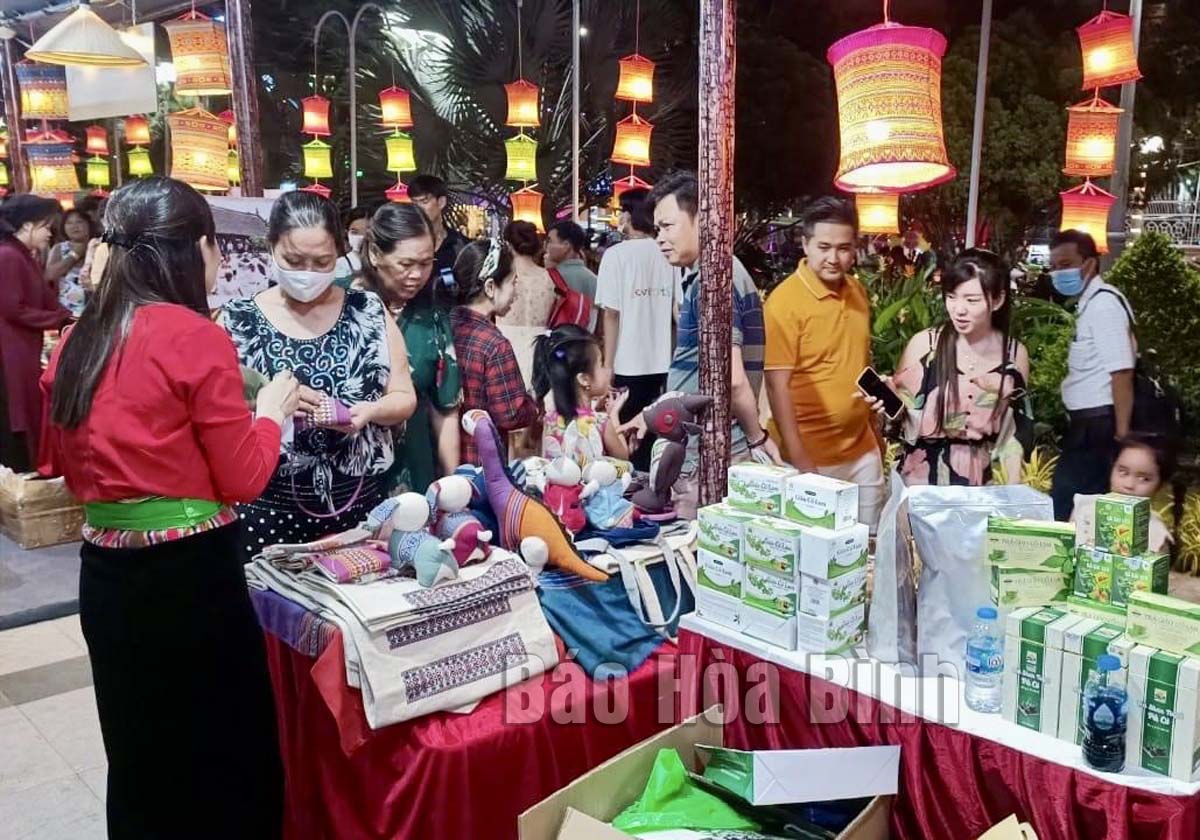
(HBO) - Implementing the tourism development cooperation programme in eight expanded Northwestern provinces and Ho Chi Minh City, Hoa Binh province participated in an expanded Northwest Tourism - Culture Week at Ninh Kieu Wharf Park in the Mekong Delta city of Can Tho from April 8-11.
The activity aimed to continue promoting and improving the
efficiency of tourism cooperation activities between Hoa Binh in particular and
the eight provinces in general with Ho Chi Minh City and the southern
localities, thus contributing to promoting and effectively exploiting the
potential and advantages of tourism among localities, and promoting tourism
recovery and development in new conditions.
PA booth introducing and promoting tourism,
cultural and OCOP products of Hoa Binh gains attention of tourists in Can Tho
city.
Hoa Binh introduced its typical tourism products
through brochures, leaflets and photos; together with provincial-level OCOP
(one commune one product) products, which attracted the attention of thousands
of visitors.
This was also an opportunity for the province to
introduce and promote tourist attractions and cultural and tourism images,
especially Hoa Binh lake national tourist area; and potential and advantages of
its natural landscapes, photos of its people, and unique cultural traditions.
The event also supported businesses in introducing attractive tourism services
in order to expand their market, and typical products./.
The clothing of women reflects the culture of the Muong, Thai, Tay, Dao, and Mong ethnic groups in the northern province of Hoa Binh.
Gongs hold a special place in the cultural and spiritual life of the Muong ethnic people in Hoa Binh province. More than musical instruments, they are an indispensable part of community rituals and collective memory, echoing through generations as a spiritual thread linking the past, present, and future.
Preserving and promoting the cultural values of the Muong ethnic group has become an urgent task in the current context, as many traditional values face the risk of fading away. This effort requires not only protecting the cultural identity but also eliminating outdated customs and developing a modern cultural lifestyle, contributing to sustainable values for the Muong community in Hoa Binh province.
The Muong ethnic culture, deeply rooted in Vietnam’s mountainous north, continues to be preserved and revitalised by dedicated individuals and communities determined to safeguard their ancestral identity.
The Muong group is one of the largest ethnic minorities in Vietnam, primarily found in Hoa Binh province. The Muong people in Hoa Binh boast a rich and diverse cultural treasure that reflects the unique identity of this ethnic group. Accounting for over 63% of the province's population, they have created and preserved numerous distinctive cultural values, contributing to their unique identity. Their cultural heritage is an invaluable asset, at the heart of their national identity, and represents a vibrant spiritual life that must be preserved and promoted in today’s modern world.
For generations, the ethnic communities of Hoa Binh province, particularly the Muong people, have preserved vibrant festivals deeply intertwined with the region’s geography, nature, and social traditions. These celebrations enrich Hoa Binh’s spiritual life and cultural identity, reflecting both folk beliefs and the intermingling of ethnic customs. Many of these festivals have endured the test of time, passed down through generations and continuing to thrive today. Among them, the Khai Ha (Going Down to the Field) festival stands out as one of the most significant events of the Muong ethnic group.



